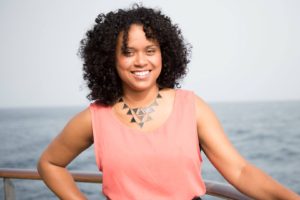In many cases, we rarely have full control over anything. When it came to my reproductive rights and my body, that was not the case. In 2016, I choose to have an abortion, and it was the best decision I could have ever made for life and my future.
The facts are that by 2016 I had already broken serious barriers within my family. I belonged to the first generation of women in my family to not be deemed a teenage pregnancy statistic, and had I had already achieved many accomplishments. But my story was not over. I was still right around the corner from graduating college, and would soon be offered my dream job of directing a racial equality coalition; all of which would have squandered my trajectory had I chosen to bring a life into this world.
I am the author of my own story, and my personal story did not include becoming a mother at 24. That is the choice I made, and it is a choice I thought hard and long about. You may ask: Do I ever regret the decision to end my pregnancy? The answer is: No. Retrospectively, I would have made the same choice a thousand times over.
To many people, that may seem cruel, selfish, or insensitive. However, in 2018, I believe in my human right to the social agency of my body, including having the full privilege to make decisions about what is entering and exiting my vagina. This being so, I would like to share my thoughts about recently proposed changes by WV legislators.
To some legislators:
What I have a hard time understanding is while you (a group of predominately, white, post-child bearing aged men) are busy trying regulate and manage the bodies of women, we have a massive drug abuse problem with no end in sight, and an economic system failing the people in the LIVING world, including thousands of public school teachers and public state employees, mere inches away from not being able to afford health insurance. What about those people?
What about LIVING children and families on the chopping block for losing SNAP benefits, due to the fallacy of SNAP fraud?
A quick note to any misogynist within our statewide, black community:
Do I agree that pro-choice has leaned towards poor, black and brown communities? Maybe, but what I take into account is I believe black women are extremely smart and capable enough of making decisions about their bodies and reproductive health. What remains important is that we uphold black women’s self-determination and agency over their own bodies, while providing them access for adequate and culturally competent healthcare providers.
Let’s press a more important issue such as better access to culturally-competent mental health providers and comprehensive medical services rather than adding to the pursuit of punishing black women in West Virginia.
To the any folks “Getting Tough On Crime”:
New York Times bestselling, Freakonomics, authored by Steven D. Levitt and Stephen J. Dubner, states:
“What sort of woman was most likely to take advantage of Roe v. Wade? Very often she was unmarried or in her teens or poor, and sometimes all three. What sort of future might her child have had? One study has shown that the typical child who went unborn in the early years of legalized abortion would have been 50 percent more likely than average to live in poverty; he would have also been 60 percent more likely to grow up with just one parent. These two factors–childhood poverty and a single-parent household–are among the strongest predictors that a child will have a criminal future. Growing up in a single-parent home roughly doubles a child’s propensity to commit crime. So does having a teenage mother. Another study has shown that low maternal education is the single most powerful factor leading to criminality.
“In other words, the very factors that drove millions of American women to have an abortion also seemed to predict that their children, had they been born, would have led unhappy and possibly criminal lives.”
“Perhaps the most dramatic effect of legalized abortion…and one that would take years to reveal itself, was its impact on crime. In the early 1990s, just as the first cohort of children born after Roe v. Wade was hitting its late teen years–the years during which young men enter their criminal prime–the rate of crime began to fall. What this cohort was missing, of course, were the children who stood the greatest chance of becoming criminals. And the crime rate continued to fall as an entire generation came of age minus the children whose mothers had not wanted to bring a child into the world. Legalized abortion led to less unwantedness; unwantedness leads to high crime; legalized abortion, therefore, led to less crime.”
To right-wing constitutionalists:
Separation of Church and State. End of Story.
To anyone else hiding behind a bible, rather than becoming a prophetic voice and standing up for human rights and dignity:
Only God can judge me.
-Gabrielle Chapman, West Virginia Racial Justice Advocate

